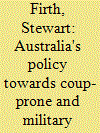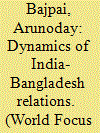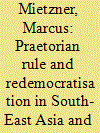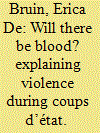| Srl | Item |
| 1 |
ID:
121669


|
|
|
|
|
| Publication |
2013.
|
| Summary/Abstract |
Events in Thailand, Fiji and Burma in 2006 and 2007 focused attention on Australia's foreign policy response to regional coup-prone states and military regimes. Australia's official reaction to these events took different forms: for Thailand, a mild rebuke that brought no change in Thai-Australian relations; for Fiji, condemnation, the imposition of sanctions and a call for the people of Fiji to rebel; and for Burma, a change of policy that brought financial sanctions against the military regime. This article argues that, in responding to these regimes in different ways, Australian governments act on the basis of differing prisms of understanding through which they assess regions and states. The differences ultimately arise from calculations of Australian national security, strategic interests, alliance maintenance and power potential, but tend to be obscured by the universalist rhetoric of promoting democracy and protecting human rights, to which Australian governments subscribe. As the security dynamic in the Asia-Pacific changes as a consequence of the rise of China, Australian policy towards coup-prone states and military regimes in the region is likely to favour stability over democracy or the protection of human rights.
|
|
|
|
|
|
|
|
|
|
|
|
|
|
|
|
| 2 |
ID:
110333


|
|
|
| 3 |
ID:
185284


|
|
|
| 4 |
ID:
121665


|
|
|
|
|
| Publication |
2013.
|
| Summary/Abstract |
Indonesia is an almost ideal case study to test a variety of explanatory propositions for the rise and fall of military regimes. Over the course of 50 years, Indonesia has witnessed a military takeover, the consolidation of praetorian rule, the toppling of a military-backed autocrat and the marginalisation of the armed forces from politics after democracy took hold. The analysis of these four periods delivers important insights into the conditions under which countries fall victim to military coups and subsequently fail or succeed in their efforts of redemocratisation. While historical, governmental, economic, international and military-internal factors are all at play, it is arguably the quality of civilian governance that has the greatest impact on a state's prospects of preventing military interventionism. In turn, the strength of civilian governments depends to a large extent on the existence of a solid democratic consensus against military rule; as the Indonesian case shows, the absence of such intra-civilian agreements delivers ample opportunities to military officers to meddle in political affairs.
|
|
|
|
|
|
|
|
|
|
|
|
|
|
|
|
| 5 |
ID:
169000


|
|
|
|
|
| Summary/Abstract |
Although just under half of all coup d’état attempts involve fatalities, there has been surprisingly little attention to the conditions under which coups turn violent. Existing research emphasizes the incentives coup plotters have to avoid bloodshed but does not explain the conditions under which violence nonetheless occurs. This article develops a theoretical framework that predicts that the extent of violence that occurs during coup attempts will vary systematically with central features of incumbent regimes and coup plotters. It then tests these predictions using new data on the fatalities associated with 377 coup attempts between 1950 and 2017. Coups against military regimes are found to be less violent than those against civilian dictatorships. This is because military rulers are better able to estimate the likelihood of the coup succeeding and more sensitive to the costs associated with using violence to suppress a coup. Since their post-coup fates tend to be better than those of other authoritarian leaders, they also have fewer incentives to hang on to power at any cost. The analysis also demonstrates that coups led by senior officers involve less bloodshed than those by junior officers and enlisted men. However, coups against rulers that counterbalance their militaries are no more violent than those against rulers that do not. The results shed new light on the dynamics of coup attempts.
|
|
|
|
|
|
|
|
|
|
|
|
|
|
|
|